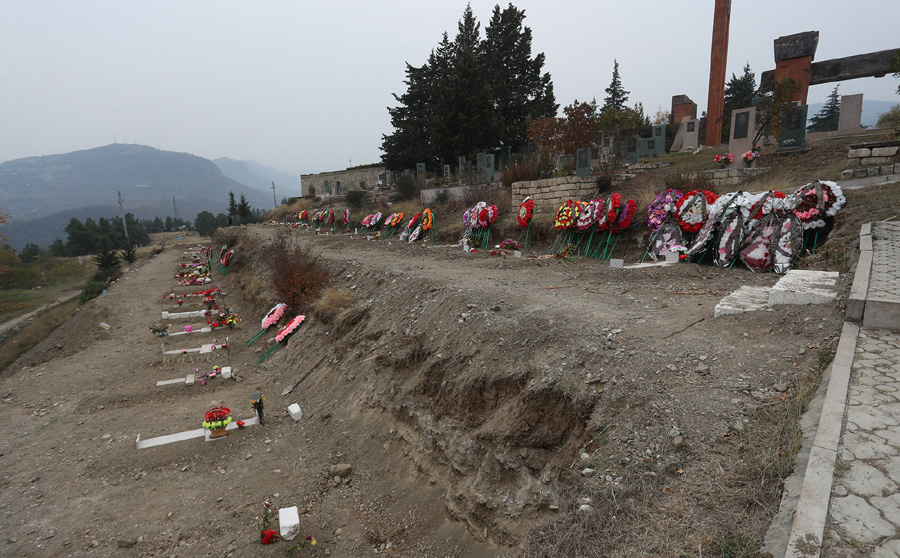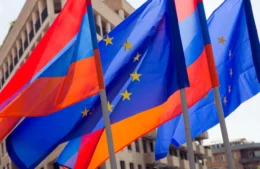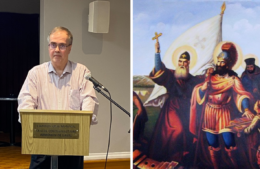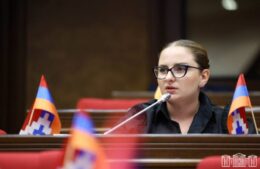An Open Letter to Members of the International Association of Genocide Scholars
- (0)

By Henry Theriault
Dear IAGS Members,
I do not write what follows in my capacity as president of International Association of Genocide Scholars (IAGS), but as a member of IAGS and a scholar of genocide, including its denial and the complexities of long-term post-genocide perpetrator-victim asymmetrical domination relations. I am also half Armenian; at the same time, for years I have been clear that any human rights violations by Armenians against Azeris should be investigated and go through an appropriate legal process, with appropriate punishments for all who committed them. I am unaware of any parallel call for Azeri accountability by any scholar (or other person) of Azeri descent, but hope there has been or will be at least one.
Those of you who have seen recent listserv posts or who are otherwise familiar with IAGS member Greg Stanton’s “Genocide Watch” website might be aware that the site has recently featured two warnings related to the current violence in and around Nagorno-Karabakh. The first raised the possibility that Armenians will be the victims of genocide by Azerbaijan, and the second, released on October 31, asserts that it is Armenians who are about to commit genocide against Azeris. When the first “warning” came out, many people, particularly Armenians, embraced it, despite fundamental problems with the whole “Genocide Watch” evaluative process, starting with the “10 stages,” which I will address shortly. The second “warning” has caused great consternation among those even moderately familiar with the situation and its history. Indeed, the initial reaction of many to the second “warning” was that the site must have been hacked by pro-Azeri propagandists, or a fake “Genocide Watch” website set up by such propagandists.
That is because the most striking feature of the second “warning” is that it follows closely the official manipulated Azerbaijani narrative of history with Armenians. This narrative ignores the concerted effort to de-develop Nagorno-Karabakh in order to force Armenians out during the entire run of the Soviet Union, as well as the initiation of contemporary violence in 1988 by Azeris who committed pogroms against Armenians in the Azerbaijani cities of Sumgait and Baku and shortly forced hundreds of thousands of Armenians out of Azerbaijan, before unleashing a Soviet-supported ethnic cleansing campaign against the 200,000 Armenians of Nagorno-Karabakh. Armenians fought back and saved themselves from destruction.
As anyone in genocide studies circles knows, the greatest sin for a victim group is to actually resist destruction. Bosnians and Rwandan Tutsi have both discovered the price of self-defense in incessant claims that they were just as bad as the genocide perpetrators they fought against. Yes, both groups had members who committed human rights violations in their defense against genocide. But that in no way proves some kind of equivalence between the groups, because the other “side” was explicitly attempting to commit genocide and initiated the violence from which the victim groups tried to defend themselves. The logic of the second “genocide warning” actually tracks the sexist legal approach that puts women who resist domestic violence by intimate partners in prison for defending themselves. It is yet more of the tried and true “blaming the victim” denial approach, which Azerbaijan has learned, with great effect, from the power actually calling the shots in the massive attack against Armenians now, Turkey. That “Genocide Watch” (1) ignored the historical and (geo)political context and (2) uncritically accepted Azeri propaganda indicates more about the website than anything actually happening in Nagorno-Karabakh.
This second point is particularly crucial. Not only does it expose the lack of any substantive vetting process for a website issuing “genocide warnings” – an activity that should be taken with great seriousness and care – but it reveals complete ignorance of the ways in which Azerbaijan is controlling all “information” about its actions and history, and has controlled it for decades. Azerbaijan has no independent media; indeed, the only place you will find even moderately responsible journalists is in Azerbaijan’s jails or in other countries after fleeing Azerbaijan. What is more, those in other countries appear afraid for their lives and refuse, for instance, to engage with progressive Armenian groups. There is no independent Azeri scholarship on its own history or relations with Armenians; scholarship, too, is government-controlled or under government threat.
The opposite is true of Armenians. The fact that the author of the second “warning,” which parrots Azeri propaganda, Nathaniel Hill, is a person who appears from his resume to be an ethnic Armenian shows just how tolerant of dissent global Armenian culture is. There are great disagreements about every issue, and scholars, journalists, and others debate them endlessly – should Armenia press the genocide issue with Turkey, or give it up in the hope of better relations with Turkey; should Nagorno-Karabakh give back the buffer areas around it to Azerbaijan in the hope that Azerbaijan won’t then turn around and launch attacks against Nagorno-Karabakh; and more. Sure, there are some intolerant Armenians, but they don’t have the power or inclination to jail journalists and force all opposing voices into silence. Looking at the comments section for any article on an issue of controversy in the Armenian American press, for instance, shows just how vibrant the debates can be.
What is more, independent journalists are not simply allowed but encouraged to move throughout Armenian areas of the warzone. Only Azeri and Turkish journalists who are completely loyal to the governments’ narratives are allowed any access to the Azerbaijani side. Many other journalists claiming to cover the story fail to question this, but simply substitute statements from Azerbaijani and Turkish spokespeople for actual journalistic investigation. Under such conditions, the default position on any media coverage or scholarship coming from Azerbaijan should be dismissed as propaganda or suspension of judgment until independent critics evaluate it. This is especially true because deniers of the Armenian Genocide frequently make the parallel false assertion that Armenians actually attacked Turks and other Muslims during World War I and committed genocide against them; most notable is Justin McCarthy’s complete fabrication of a “genocide” of 2.5 million Turks and other Muslims by Armenians numbering, according to Turkish sources, fewer than 1.5 million. It is a mystery why Stanton, as experienced as he has been with Turkish denialism, did not question a recycled version of discredited denial when it was promoted by Azeris.
There is a deeper problem. Those who embraced the “warning” that Azerbaijan is committing genocide against Armenians also did so just as uncritically. On the one hand, the extensive genocidal hate speech, including statements about destroying Armenians and referring to them as “dogs” and “remnants of the sword” whose ancestors should have been killed in the 1915 genocide, along with Turkey’s unrepentant celebration of the 1915 genocide and Azerbaijan’s active mimicry, exhibit clear intent. On the other, a “warning” from “Genocide Watch” based on an unscientific process is meaningless. The facts of the risk of genocide by Azerbaijan and Turkey are rather clear; a “warning” from “Genocide Watch” adds no weight or legitimacy to those facts, but simply summarizes a body of evidence that is already clear and stands on its own.
A more extended critique of the “10 stages” approach to genocide will be included in a chapter by me in a forthcoming book edited by IAGS member Jim Cox. Here I will restrict myself to points especially relevant to the issue at hand. First, the “stages” of genocide assume genocide happens in a consistent and teleological manner that defines it. But even a shallow examination of any reasonably large set of genocides shows that this is not the case. The stage approach is actually what I will call a “backwards teleology,” that is, produced by working in reverse from a completed genocide. By working backwards, a supposed causal sequencing magically appears. The problem is, there are genocides that have not followed anything close to the pattern claimed, while there are many non-genocides that have included many of the stages indicated, even extermination. The latter means that there are many false negatives: imminent or even accomplished genocides do not register as such according to the “10 stages” approach. (Of course, Ptolemaic efforts can be used to fit any case of genocide to the “10 stages” approach, but such extreme stretches reverse the appropriate direction of inference because they are typically made only after an event has been shown to fit the UN definition of genocide – and how can an “early warning” system have validity when it is used to look back from cases in which genocide already happened?) The “10 stages” approach is completely unscientific. The only way it could be established scientifically is if the “10 stages” method were shown to apply only to genocides as well as necessarily to genocide; but the facts show neither of these are the case. This exposes a basic logical fallacy in the inference from all or some of the “10 stages” to the claim that genocide is happening or imminent.
The very notion of a teleology of genocide “stages” itself is suspect, given what we know of the complex ways in which actual social processes occur. The “10 stage” approach attempts to force real events to fit a reductive “grand narrative” model while excluding from concern those that do not. The impossibility of fitting the model to reality is evident in the fact that even its proponents misapply it. For instance, in the October 31 “warning,” the author claims that Armenia is at both stage 8 and stage 10. This makes no sense – a process is either at stage 8 or at stage 10; it cannot be at both, or the whole notion of developmental “stages” is negated.
Second, by international law, genocide is defined by a specific intent to destroy a group because of its group identity. It is not defined because there is “polarization” or “denial” or some other feature, which are contingent according to the law. The “10 stages” confuses the features of some genocides (and many non-genocides) with determining characteristics of “genocide” as a legally descriptive term. An analogy might make the problem with this clear. Blood is a red liquid that dries when exposed to low-humidity air. Wine can also be a red liquid that dries when exposed to low-humidity air. The fact that we observe a red liquid drying in low-humidity air does not justify our asserting that the substance is blood, any more than the occurrence of all or some of the “10 stages” determines that an event is genocide. This reflects another basic logical fallacy. Thus, the “10 stages” approach leads inevitably to false positives.
Given these basic problems with the “10 stages” approach to genocide, it is no wonder that actions by Armenians can be represented as possible genocide according to this approach. Indeed, just about any violence, including most notably defensive violence, can be pressed to fit somewhere along the “10 stages.” Because the “10 stages” approach fails to differentiate genocides from non-genocides in any consistent manner and in fact leads to many false positives and false negatives, it has no value as a predictive tool. Because of this inconsistency and lack of foundation, the “warnings” issued by “Genocide Watch” and anyone else relying on the “10 stages” – as well as their omissions – are the function predilections, opinions, or agendas on the part of whoever is using the “10 stages.” While it might be useful in simplifying certain cases of genocide to be comprehensible to high school students and diplomats without significant knowledge of those cases, that is the limit of any possible utility of the “10 stages.” While highlighting the ethical wrongness and danger of many practices that are among its “stages” is certainly worthwhile, these practices are bad in themselves, and not because they lead to genocide – because they might not.
That the “10 stages” approach is used as the basis of what is promoted as a serious policy-oriented “early warning system,” which includes a risk rating, is not merely a critical error but dangerous. Each time someone with good intentions (or nefarious ones) applies it to produce a false negative, denial of an impending or ongoing genocide is aided significantly. And, each time someone applies it to produce a false positive, the reality of what is going on is obscured. When the false positive is an inversion of actual perpetrator and victim, a powerful weapon is handed to the perpetrators who are misrepresented as victims, and true victims will die as a result.
What is particularly disturbing is that Stanton admits to understanding some of these problems, yet still relies on the “10 stages” as a predictive tool. I would like to believe in the good intentions of him and others involved with “Genocide Watch.” But whether their intentions are good or not is beside the point. In the present case, the presumptuousness and unconcern for the real consequences of issuing such laxly conceived and carelessly tested “warnings” will not be paid by them, in their comfortable lives, but by the thousands of 18, 20 and even 50 year-old “soldiers” as well as the civilians on both sides who are likely to die in the coming weeks and months.
There is an upside to the current debacle, if it is minor compared to the potential harm “Genocide Watch” is doing. At least because of the clear invalidity of the “warning” issued Saturday, “Genocide Watch” can be seen as the unauthoritative website and organization it is. Like many other websites, it reflects the opinions of the few individuals involved in it, not a meticulous, rigorous, legitimate analysis of cases of mass violence and oppression. Thankfully, in contrast, there are many members of IAGS whose work is legitimate and makes a positive difference in the struggle against mass violence and for human rights and dignity.


















